 MyDogBreeds
MyDogBreeds Hanover Hound is originated from Germany but Beagle-Harrier is originated from France. Both Hanover Hound and Beagle-Harrier are having almost same height. Hanover Hound may weigh 28 kg / 62 pounds more than Beagle-Harrier. Both Hanover Hound and Beagle-Harrier has almost same life span. Both Hanover Hound and Beagle-Harrier has almost same litter size. Hanover Hound requires Low maintenance. But Beagle-Harrier requires Moderate maintenance
Hanover Hound is originated from Germany but Beagle-Harrier is originated from France. Both Hanover Hound and Beagle-Harrier are having almost same height. Hanover Hound may weigh 28 kg / 62 pounds more than Beagle-Harrier. Both Hanover Hound and Beagle-Harrier has almost same life span. Both Hanover Hound and Beagle-Harrier has almost same litter size. Hanover Hound requires Low maintenance. But Beagle-Harrier requires Moderate maintenance
 Sometimes referred to as a Hanoverian Hound, this dog dates way back to the 17th century in Germany.
Sometimes referred to as a Hanoverian Hound, this dog dates way back to the 17th century in Germany.
This dog breed continues to be fairly rare today and has always been used as a hunting and tracking dog. It is believed the dog comes from bloodhounds dating back to medieval times. The dog isn’t recognized by the AKC but he is a member of the Scenthound group.
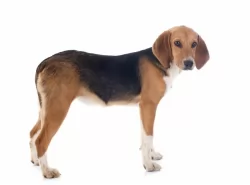 The Beagle Harrier, the breed that was made mixing the France Scent Hounds and a Beagle.
It is not quite sure if this breed was made on purpose or the mix of the breeds happened and resulted in a great dog so the breeding continued.
Since they are not large dogs as hounds, they are used to hunt small animals.
The Beagle Harrier, the breed that was made mixing the France Scent Hounds and a Beagle.
It is not quite sure if this breed was made on purpose or the mix of the breeds happened and resulted in a great dog so the breeding continued.
Since they are not large dogs as hounds, they are used to hunt small animals.
This first breeding took place in England, but after the 14th century, they were breed on purpose in France.
 This is a sturdy, well built dog with a short, smooth, dense coat which is a reddish-brown color with brindling.
This is a sturdy, well built dog with a short, smooth, dense coat which is a reddish-brown color with brindling.
He is a well built, deep chested dog standing at about 50 – 55cm in height and weighing 48-53cm. He has the typical dark brown, soulful eyes of the Hound dog with long, broad, floppy ears.They usually have black noses, he has a deep chest, strong, straight legs and long, tapering tail.
Calm and gentle, the Hanover Hound is a loyal dog who bonds closely with his human family. When you socialize him he gets along well with children.
He is a hunting dog and loves nothing more than to be following some scent. You can call out his name, but he will not likely take notice, so determined is he to track down his prey, being known for his superb sense of smell.
His hunting instincts are strong and this means that you won't often find him being kept essentially as just a pet – they are first hunting dogs and then pets. Nonetheless, as already suggested, the Hanover Hound is more than capable of forming a strong bond with his human family, making a good family pet.
He is aloof and wary with strangers and this makes him a good watchdog. It is important to have him trained and socialized as then he becomes obedient and amicable when you need him to be like that around friends and family.
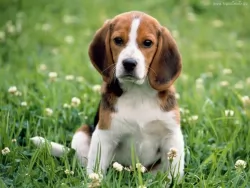 The Beagle Harrier is a scent hound that is described as a big sized Beagle or a small sized Harrier. This breed was developed from this two breeds, actually. Despite the looks of these breeds, the Beagle Harrier is an energetic kind of dog who gets very attached to his family. This medium sized pet comes in variations of colours and they are usually tricoloured. They usually have dark coloured eyes, white paws, and They usually grow up to have a very muscular body, but, if you don’t provide them with the daily activity they need, they will quickly get obese and unhappy.
The Beagle Harrier is a scent hound that is described as a big sized Beagle or a small sized Harrier. This breed was developed from this two breeds, actually. Despite the looks of these breeds, the Beagle Harrier is an energetic kind of dog who gets very attached to his family. This medium sized pet comes in variations of colours and they are usually tricoloured. They usually have dark coloured eyes, white paws, and They usually grow up to have a very muscular body, but, if you don’t provide them with the daily activity they need, they will quickly get obese and unhappy.
 The Hanover Hound is an intelligent dog breed that responds well to training and socialization. They are dedicated hunting dogs but they are loyal and loving to their human family.
The Hanover Hound is an intelligent dog breed that responds well to training and socialization. They are dedicated hunting dogs but they are loyal and loving to their human family.
He will require an owner who is active and on the go while being firm and consistent with his treatment of him.
When socialized, he makes a good friend of children too. Keep him busy, exercise him, provide him with good food and consistent love and attention and he'll make you a devoted hunting companion and friend.
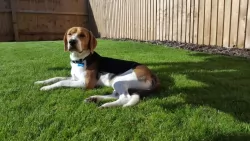 The Beagle Harrier, if trained properly and socialized while he was still a pup, will be the great playmate for any child. They get along with strangers, as well. We might say that they will get along with anybody who is ready to run and play with him. Children are most likely that kind of playdate, so it appears that they like children more. The Beagle Harrier is a great family pet, and he is great with babies, toddlers, teenagers… so don’t be afraid to leave the dog alone during the playdate!
The Beagle Harrier, if trained properly and socialized while he was still a pup, will be the great playmate for any child. They get along with strangers, as well. We might say that they will get along with anybody who is ready to run and play with him. Children are most likely that kind of playdate, so it appears that they like children more. The Beagle Harrier is a great family pet, and he is great with babies, toddlers, teenagers… so don’t be afraid to leave the dog alone during the playdate!
hunting, scent tracking, search dog
Some will say that the Beagle Harrier is one of the most desirable pets because of his loving and lively nature. They get along with almost anyone and they don’t mind living indoors if you have the time to take him out for a daily run each day. They will do great in a large group of people and any public places so you can take your Beagle Harrier with you anywhere you go.
Since the Beagle Harrier is placed in a group of the hound dogs, you must be aware that he will have the attitude of the pack leader. Once you got the Beagle Harrier puppy, you must start training and socializing him in order to grow the pet that will be easy to handle and accepted by the family and all the people around you, even strangers. They are very intelligent and they have a calm nature so they will be quite easy to train.
 Capable of living to between 10 and 14 years of age, the Hanover Hound, like many other dogs, may well be prone to some of the more common dog illnesses there are.
Capable of living to between 10 and 14 years of age, the Hanover Hound, like many other dogs, may well be prone to some of the more common dog illnesses there are.
Because of his long, floppy ears, he will typically be more prone to developing otitis externa. This is why it is important to be checking your long, floppy-eared dog regularly and cleaning his ears to avoid wax- and dirt build-up and infection. Chronic ear infections will have to be treated by your vet.
You'll recognize the illness when you see your pet shaking his head often and scratching at his ears.
This is a genetic orthopedic disorder that affects many dogs and will eventually cause lameness. Hip dysplasia is due to malformed hip joints.
Eye diseases and problems with the eyelid can cause your pet a lot of discomfort as this is when an eyelid rolls in and then rubs against the eye.
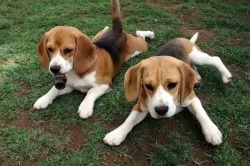 Almost every active dog suffers from joint diseases. Even though it’s generally a genetic disease, you can lower the chances of hip or elbow dysplasia by taking care of your dog’s weight, diet and daily exercise.
Almost every active dog suffers from joint diseases. Even though it’s generally a genetic disease, you can lower the chances of hip or elbow dysplasia by taking care of your dog’s weight, diet and daily exercise.
The Beagle Harrier has big ears that are always set down. That makes them ideal for the dirt accumulation, ear irritations and ear infections. Check his ears regularly and clean them at least once a week.
 The Hanover Hound is a hunting breed so he won’t easily adapt to life in the city with a tiny garden. He will need a large garden or a farm to run around in.
The Hanover Hound is a hunting breed so he won’t easily adapt to life in the city with a tiny garden. He will need a large garden or a farm to run around in.
He is a hunting dog that loves to put his nose to the ground and to follow a scent. This is a dog breed which will need to be provided with a good amount of exercise every day to ensure his happiness and health.
As a large dog breed, you want to be sure to be feeding him a high quality food. It is always a good idea to add in some home-made food to his kibble. Read the packaging carefully of commercial manufactured dog foods and make sure you get food that is geared towards large, active breed dogs.
Add in cooked food such as cooked chicken, vegetables or brown rice and pasta and remember to include some raw meat into his diet from time to time.
Before dogs were domesticated they would eat raw meat as opposed to harmful grain based commercial dog foods of today. Benefits of adding in some raw meat from time to time include healthier skin, more energy and shinier coats and eyes. Make sure your pet has a constant supply of fresh, cool water.
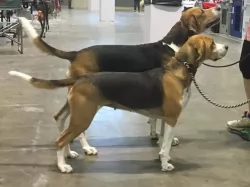 Since the Beagle Harrier is an active dog breed, they will need food for the active dogs. Make sure you provide them with quality food that will give them enough strength to get through the very active day, and not gain too much of the weight. It is very important that you don’t overfeed him because this breed quickly becomes obese. It is advisable to use treats while you train him to do new tricks, but be very careful with the amount you give to the dog.
Since the Beagle Harrier is an active dog breed, they will need food for the active dogs. Make sure you provide them with quality food that will give them enough strength to get through the very active day, and not gain too much of the weight. It is very important that you don’t overfeed him because this breed quickly becomes obese. It is advisable to use treats while you train him to do new tricks, but be very careful with the amount you give to the dog.
Puppies need to be fed only two times a day. Once you decide which brand of food you will use, stick with them until the dog is 6 months old. Make sure they have enough nutrients and the quality ingredients that will help them with growing strong and healthy bones.
If you want Beagle Harrier to grow up in a happy and healthy dog, make sure you provide him with quality food, lots of exercises and unconditional love. They are extremely loving and they get depressed if left alone. Grooming tips are very clear – they need a regular brush because shed a lot. The more you brush, the less hair you will find on your hands during the belly rubs.
If your Beagle Harrier is trained and socialized, the dog park will be the best daily activity for him. If there is no dog park near your house, take him to the bike ride, jogging, swimming, hiking, markets, parks… They love to be off the leash and with people but since they are the hound dogs, don’t be surprised if they get distracted by smelling something more interesting than the ball. They would love to grow up in a house with a large yard, but, if you live in the apartment, make sure that you take time for his daily activity.